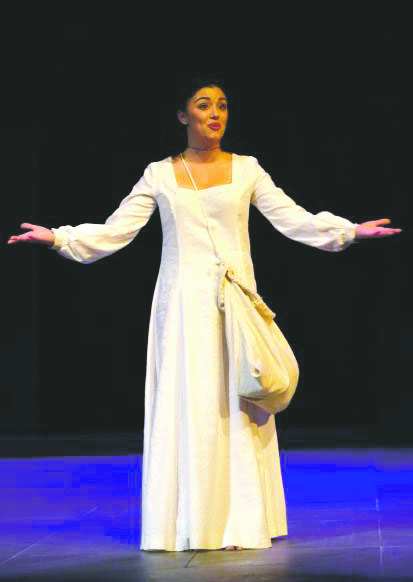
Ghosts, drama, sex and comedy illuminated Watters Theater on Friday, during the opening night of “Anne Boleyn.” Set in the court of Henry VIII in England, the play centers on the controversial queen and takes a modern approach to an exciting period in history.
Written by Howard Brenton, this new take on religious and political upheaval opened first in 2010 at the Globe Theatre in London, then toured England and Scotland before coming to the U.S.
“For me, it makes history come alive,” said Anne Brady, the play’s director and a professor in the Theater department.
The director immersed herself in 16th- and 17th-century England by doing her research before directing the play, and she encouraged her cast to do the same.
“I compiled a list of possible research topics for them and I said, ‘Have fun. Only do what’s fun for you and what you think would be useful for your character,’’” Brady said.
All cast members’ performances showed that they fully understood their characters’ personalities. By channeling their research into their roles, the cast of “Anne Boleyn” showed both a collaborative effort and chemistry. The stage filled with colorful gowns, music and dancing as actors illustrated the lives of English royalty.
Rob Tendy plays King Henry VIII, a royal who feels strangled by his arranged marriage and the pressures of politics and religion.
“Henry is interesting in that he is constantly on a search for freedom,” Tendy, a junior majoring in theatre, wrote in an email. “What Henry wants is a chance to let loose, go hunting, listen to good music, get drunk and spend time was the girl he loves. For him, Anne is the key to achieving all of this.”
The play opens with the ghost of Anne Boleyn, played by freshman Danielle Nigro, addressing the audience directly and removing both a Bible and her severed head from a bag. The drama and violence, though, were offset by the bold comedy throughout the play — multiple characters “break the fourth wall” to speak to the audience.
The perfect balance of drama and comedy will have the audience hooked. From James I dressed in drag to the religious tumult that Anne Boleyn sparks, the play seamlessly changes moods and time periods. Since the play is not chronological, the changes between scenes of Anne’s rule and the present with James I as her successor create a dynamic story line.
Modern language brought historical fiction to a relatable level. In one scene of the play, Anne insults her lover Henry VIII’s wife by calling her a bitch, to the audience’s delight. The bawdy humor and historical drama work in harmony to tell the story of the start of the English Reformation in an engaging way.
“People are really interested in this time period and this topic of Henry VIII right now,” Brady said.
“Anne Boleyn” is just one of many historical fiction pieces on this period, including the upcoming BBC series “Wolf Hall,” an adaptation of Hilary Mantel’s novels “Wolf Hall” and “Bringing Up the Bodies.” The play’s interpretation shows audiences why this time period and the time period of James I fascinates so many.
“Anne Boleyn” will be playing in Watters Theater at 8 p.m. on May 2 and 3, with the last performance at 2 p.m. on May 4.


